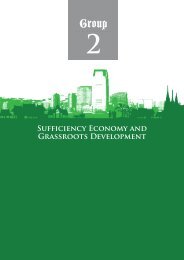Conflict, Legitimacy and Government Reform: Equitable Allocation of ...
Conflict, Legitimacy and Government Reform: Equitable Allocation of ...
Conflict, Legitimacy and Government Reform: Equitable Allocation of ...
You also want an ePaper? Increase the reach of your titles
YUMPU automatically turns print PDFs into web optimized ePapers that Google loves.
52 KPI Congress XI<br />
A good taxation system must not have a huge impact on incentives,<br />
causing fund transfer or a person’s relocation to other countries where<br />
taxes are lower. The principle should be who needs to pay taxes must do<br />
so according to one’s status. Moreover, those receiving much benefits<br />
from public expenditure should be willing to pay taxes at a greater<br />
proportion <strong>of</strong> income, compared to those receiving less benefits. So, we<br />
should pay attention to acceptable, fair allocation <strong>of</strong> tax burden.<br />
(Harberger, 1974: 259) Regarding this issue, a progressive taxation<br />
system (a person with higher income pays a higher percentage <strong>of</strong> income<br />
but taxes should not be too high <strong>and</strong> de-motivate) combined with public<br />
expenditure that benefit everyone should be a primary goal. At the same<br />
time, taxation system should include measures that force those with<br />
excessive wealth to utilize their assets to generate benefits (help increase<br />
productivity <strong>and</strong> employment), not hoarding them for speculation.<br />
Do fiscal policies <strong>of</strong> Thail<strong>and</strong> support the poor?<br />
Taxation system: We must consider both taxation system <strong>and</strong><br />
public expenditure.<br />
Direct <strong>and</strong> indirect taxes are government’s main revenue sources.<br />
Direct taxes are collected from individuals according to income <strong>and</strong> asset<br />
bases, for example, personal income tax, corporate income tax, property<br />
tax <strong>and</strong> inheritance tax (the latter two types are not prominent in our<br />
country). Most indirect taxes are imposed on various products, such as<br />
value-added tax, excise tax, oil tax <strong>and</strong> custom duty, <strong>and</strong> collected when<br />
spending is made on purchase <strong>of</strong> such product.<br />
In Thail<strong>and</strong>, personal income tax is progressive, that is, those with<br />
high income pay a higher tax rate than those with less income; but<br />
corporate income tax is the same rate for everyone.<br />
Indirect taxes are collected from everyone at the same rate, no<br />
matter whether incomes are different or not. In this case, “a poor<br />
household may take a heavier tax burden (compared to income) because<br />
the ratio <strong>of</strong> consumption (C) per income (Y) <strong>of</strong> poor household is higher<br />
than rich household.” (TDRI, 1999: 1, footnote 1) Therefore, the real














